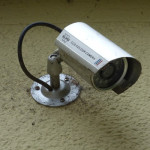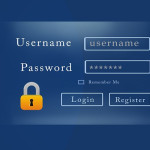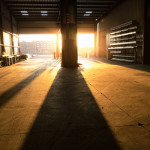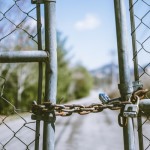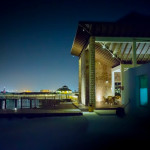Prevent Blind Spots In Your Surveillance System
Security camera systems are meant to protect your property from intruders and collect crucial footage should any incident occur. Unfortunately, if not properly planned, your surveillance system may have blind spots that can be problematic. Blind spots are specific areas that are not in the field of view of your CCTV cameras. These blind spots leave your home vulnerable to intruders who may take advantage of these to gain access or damage your property.
Here are some useful tips to avoid blind spots within your surveillance system.
Take A Picture
Visualizing what you want to cover will help you plan where to place your cameras for optimal coverage. You can use these images as a reference to consult with experts on which type of security cameras, lenses and specs would be best for what you are trying to achieve.
Have an existing system? Test your camera’s FOV (field of view) by having a friend walk through your home while you monitor the live feed.
What Do You Want To Capture?
Prioritize what features are absolutely necessary and the ones that are optional. Also, consider the camera locations and what your goal is for each area. This will help you determine the appropriate resolutions for your different cameras.
Consider Natural Environment
Whether you are installing your security cameras indoors or outdoors, you must consider natural elements of the environment. From daylight to reflections to inclement weather, these elements can noticeably hinder your footage, sometimes even rendering it useless.
To avoid these issues, pay close attention to camera angles and placement. Be sure that there are no potential obstructions, such as branches, trees, or décor, in your camera’s FOV. Invest in cameras that have day/night vision and lenses that can automatically adjust themselves to provide the best picture. And lastly, for your outdoor surveillance, choose weatherproof cameras and/or weatherproof camera housing to protect your equipment from unpredictable weather conditions.
Vandalism Potential
Intruders will often look for cameras and their first instinct is to destroy them in hopes that they can wipe out or prevent evidence of their crime. To prevent this, install cameras high and out of reach when possible, and seek out cameras that are vandal proof.
Location, Location, Location
As previously (and repeatedly) mentioned, the placement of your cameras is crucial to eliminating blind spots. If you are having trouble planning and strategizing your security cameras, or simply need expert advice, feel free to contact us at 888-203-6294.
Do you have your own security camera system advice to share? Connect with us on Facebook, Google+, Twitter, LinkedIn, and Pinterest!
Visit SecurityCamExpert.com to browse our vast selection of quality CCTV surveillance and security camera systems at affordable prices. We also offer site surveys and installation services. Contact us for more information.
What Can Your Security Camera Do?
Surveillance camera systems help to provide home and business owners security, protection, and peace of mind. But did you know you can use your security cameras for additional purposes? Here are some lesser known uses and benefits of security camera systems.
- Time Lapse Videos
Some cameras come equipped with a time lapse feature which can allow you to create videos to display changes over time. These are great for construction or demolition sites, for capturing weather, nature, or wildlife.
- Animal Life
Do you manage a barn, farm, or ranch on your property or remotely? Security cameras can save you time and travel costs by allowing you to check in on your animals remotely. And if you have pregnant livestock, you can keep an eye on the progress and possibly record the birth.
- Pranks
If your family is a fan of pranks, security cameras can come in handy. Features like two-way audio and alarms can startle your unsuspecting guests, and you can capture the reactions as a souvenir.
- Check Weather
Did you know security cameras help when checking the forecast? When you see images and footage from remote areas, such as when you are checking a weather application, those are taken from strategically placed security cameras.
- Capture Precious Family Moments
Whether it’s your baby’s first steps or first words, you may be able to capture it on video. If you were away when it happened, you can review it later, and you can also share the special moment with other family members and friends.
- Insurance Discount
While the cost of security cameras may discourage homeowners, the benefits of having it should be considered. Aside from peace of mind, insurance agencies often offer a discount as well. And this discount can help to offset the costs of the system.
- Prevent Abuse
Nanny cams help to ensure that your babysitter is behaving properly and that your children are safe. On the other hand, nanny cams can also help you keep an eye on your elderly family members and caregivers to make sure your loved ones are not in danger.
- Medical Assistance
Speaking of seniors, especially those who live alone, some home security systems come equipped with emergency pulls or medical alert pendants. When triggered, these instantly dispatch emergency assistance to homes.
- Stop Trespassing & Vandalism
Whether it’s the neighborhood kids or unwelcome intruders, your security cameras can help to prevent any trespassing or vandalism.
- Household Mysteries
Have things gone missing or end up in random places in your home? Want to know who finished your leftovers in the refrigerator? You can review your surveillance footage to solve the mystery.
- Guard Your Garden
For the gardeners out there, you can set up security cameras with motion detection to monitor your goods. If squirrels, raccoons or the like are ruining your crop, you can set up your motion sensor to sound an alarm to scare off the critters.
- Latchkey Kid Safety
Security camera systems enable you to have peace of mind when it comes to latchkey kids. Your system can alert you when someone enters your home, therefore, you will know when your kids get home from school. You may disarm the alarm remotely or have your children do it.
- Increase Resale Value of Home
Having a surveillance system already installed in your home can increase the resale value of your home. It can also keep your home protected during the selling process as you can keep an eye on the strangers that come and go during open houses and inspections.
What other benefits can you think of? Share with us on Facebook, Google+, Twitter, LinkedIn, and Pinterest.
Let us help you choose and install the security camera system of your dreams. Browse our stock online at SecurityCamExpert.com or call 888-203-6294 today!
Avoid These Common Security Camera Mistakes
Whether you rent or own your home, you want to make the property as unattractive as possible. Things like outdoor lighting, guard dogs, alarms and security systems act as deterrents for would-be burglars and trespassers. Unfortunately, common mistakes can weaken your security measures. Discover the most common security mistakes and ways to avoid them.
- Mistake: Hiding Security Cameras
Although they may take away from your home’s aesthetic, your security cameras should be visible from the street. One of the benefits of security cameras is that they act as a deterrent for burglars. By hiding your cameras, you negate that benefit. And even if they do not succeed at discouraging thieves, you will have video footage that can help to identify the trespassers.
But remember, you want the cameras to be visible, but also out of reach to prevent tampering and vandalism. A sign warning that your property is under surveillance can also help.
- Mistake: Camera Positioning/Locations
Choosing the right locations for your security cameras may seem easy, but there are lots of factors to take into account. Security cameras should be able to provide proper coverage around the clock. You need to consider direct sunlight in the afternoon, which can washout the footage, or how things such as rain, snow, or tree branches, may compromise the field of view and produce unusable footage. In addition, internet-connected smart cameras need to be installed where there is strong and consistent Wi-Fi signal.
Keep your camera in a sheltered area that’s in the shade all day. You may even want to invest in camera housing for added protection. Also, test your live feed in a variety of weather conditions to ensure your cameras produce usable footage in all situations.
- Mistake: Buying Cheap Systems
While low-priced systems may seem appealing, often times you get what you pay for. These systems may not come with the special features you want or need, but if budget constraints limit your options, something is better than nothing. However, if you have a more flexible budget, you should be sure your basic needs are met.
The most important takeaway: do your research. Read reviews and users’ feedback, search online for examples of the video output, and look into warranties and technical support should you need it in the future. You should trust that you are investing your time and money into a quality camera that will satisfy your surveillance needs.
- Mistake: Not Changing Passwords
When you have an internet-connected system, you are able to access your feed remotely. A default username and password are used for the initial access. A common mistake is that users do not change these default username and passwords, which are usually available on the manufacturer’s website. Hackers know this and if you fail to change these, they can gain access to your feed. From there, they can learn about your daily routines and get an idea of the layout of your home.
It is strongly advised to change the defaults as soon as possible and create a password that is unique, but that you can remember.
- Mistake: DIY Installations
Professional installation can help you avoid many of the aforementioned mistakes. They will choose appropriate locations for your cameras based on your needs and the environmental factors. If your cameras aren’t functioning properly, they will come back to fix the issue and most companies will offer a warranty. If you opt for a DIY installation, you are responsible for any issues that arise.
Need help finding the right security system for you? Choose SecurityCamExpert.com! We can guide you through the process of choosing the security cameras that will best suit your needs. If you are in Southern California, we can even install the system for you. Visit us online or call 888-203-6294 to learn more. You can also connect with us on Facebook, Google+, Twitter, Linkedin, and Pinterest.
Commercial Surveillance Camera Placement
For commercial businesses, video surveillance not only keeps customers, employees and properties safe, but it can also prevent incidents and potentially catch the perpetrator if a crime occurs. Should you decide to install a video surveillance system at your business, choosing the right locations is crucial. You want to avoid leaving blind spots as that will compromise your security, making your investment virtually useless.
For a better idea of where you should place your security cameras, here are the best locations for commercial properties.
Entrances & Exits
From the front/main entrance to side or back doors, you want to monitor any and all areas in which individuals can gain access to your building. This allows you to track who enters and exits, and whether or not they have authorized access.
You want to aim your indoor cameras toward the inside rather than at the door. The lighting conditions may change drastically when the door opens and closes, thus compromising the quality of your video.
For increased security, you may want to consider installing monitors that display a live feed on the screen at the entrance of your business to let visitors know they are under surveillance.
Restricted Access Areas
Doors that require a key card or an entrance code should be monitored. This provides an audit of who comes and goes, and who may have tried to gain unauthorized access.
Asset Storage
Whether it’s a warehouse full of merchandise or a server room filled with priceless equipment, you want to position a few cameras (the number will depend on the size and layout) to keep an eye on the area(s) where you store your assets.
By installing surveillance cameras in places where you store resources, documents, or even office supplies may potentially reveal cases of employee theft that may otherwise go unnoticed.
Monetary Transactions
It should go without saying that any point at which money regularly changes hands should be under surveillance. For example, security cameras should oversee cash registers at retail locations, teller stations at banks, and other transaction points on the property.
And you want to mount cameras low enough to see faces. You may even consider mounting a small camera at counter level in case of hats or hooded garments that may obstruct the view of a person’s face.
Work Areas
Whether or not you deal with customers at your location, it is still beneficial to keep an eye on employees. This usually discourages any slacking off or misbehavior. Just remember, you must disclose that there are security cameras and that they are under surveillance.
Loading Docks
Loading docks are prime targets since shipments are delivered and/or sent out from there. You want to have surveillance cameras watching over these areas to protect your employees and assets.
These cameras can also help with false worker’s compensation claims related to injuries sustained while loading or unloading equipment. Installing flood lights in this area also helps to produce clearer footage.
Secluded Outdoor Areas
These include parking lots, alleyways and dumpster pads – all of which are prime locations for shady activity. Security cameras installed in these areas should deliver a live feed to the security office so that a guard may watch for suspicious activity.
Along with surveillance locations, quality equipment suited for your security needs is vital for a successful surveillance system. Let us help you find the right security cameras and equipment for you – visit SecurityCamExpert.com or call 888-203-6294 today! You may also connect with us on Facebook, Google+, Twitter, LinkedIn, and Pinterest.
Risky Home Security Measures
Home security measures are meant to protect you from unwanted intruders, but sometimes these measures can backfire. Here are some common home security measures and mistakes you should avoid.
Privacy Gates & Fences
While these may be put in place to preserve your privacy, they can actually provide cover and hiding spots for burglars. Intruders can benefit from the privacy provided and work on forcing entry into your home unseen.
While every house and property is unique, try to plan your fencing in a way that allows the main entryway to be visible from the street. Since doors are a common entry point for burglars, this can help to make it more difficult for criminals to gain access without being detected.
Hidden Keys
These are helpful if you have people checking in on your home or in the event you accidentally lock yourself out. However, most homeowners choose obvious spots for hiding keys, which burglars are keen to and will immediately check.
Generally it’s better to hide the house key further from the home in less obvious spots. And a disguised item, such as a rock, is only useful if hidden among similar items.
Bushes
Your landscaping can make your home more or less friendly for intruders. If you have bushes or trees right up against the side of your home, they can provide cover in the same way that a fence might.
You don’t have to give up on your plants all together, but it is important to keep their placement in consideration. Choose low-height or thin-growing shrubbery immediately beside your home while keeping denser and taller plants further out.
Static Lights
Most homeowners install outdoor lighting for home security, whether they turn them on at the end of the day, or place a timer or light sensor so that they turn on automatically at night. These lights provides illumination for the yard, however, these can also create dense pockets of shadows that make for great hiding spots.
Motion sensor lights are a better alternative. They will provide outdoor lighting while shocking anyone who is prowling around your property. Motion sensor lights will also be used less often, resulting in lower electrical bills and longer lived light bulbs.
Valuables
We often forget that windows work both ways, thus intruders can see inside our homes. This is precisely why we should never leave our valuables in plain sight. Especially on the ground floor, be mindful of things like jewelry that may be left out on dressers and possibly visible from the windows. Televisions may be hard to position out of view, so remember to pull the shades or blinds shut in the evening.
Packaging Disposal
Packaging from an expensive item, such as a television or laptop, should not be set by the curb. This tells thieves that there is an expensive item in your home. Instead, take time to break down the box and cut it into smaller pieces to disguise what it once held.
Alarm System
Alarm systems are a smart tool, but be sure that your installers mount the control pad in a location that is not visible from a first floor window. Potential burglars may be able to see whether or not the alarm system is activated. This is especially true at night when the green or red status light is clearly visible in a darkened home.
Social Media
Social media is a fun way to stay in touch with friends and share travel experiences, but it should be done after the trip.
Because social media is mostly a public platform, you don’t want to announce to the world that you’ll be out of town. Burglars can easily search common keywords (ex. trip, travel, vacation) to potentially find out when homes will be empty.
To avoid this, share your wonderful photos and stories about your trip after you return home. IF you must share, be sure you are sharing it privately so only your close friends and family can see.
Mail Pileups
Piled up mail and newspapers scream that homeowners are away, and this is visible to anyone who simply drives by your home. Before you leave, contact your local post office and/or newspaper to temporarily suspend service. Or you can ask a friend or neighbor to pick up any mail or newspapers while you’re away. Activity around the front of the home will help to make your home look occupied as well.
Ladder Access
Most of these tips have addressed first-floor issues because it’s much more difficult to break-in through the second story. However, some homeowners may not know that they are providing simple and easy access to their second floor. Refrain from leaving your ladder in the yard where it can be easily seen and used by burglars. Instead, store it away in a garage or locked tool shed.
Assuming Daytime Is Safe
Break-ins are often associated with nighttime, but daytime break-ins are quite common. This is because burglars prefer an empty home, and during the day, most occupants are at school or work. With that said, the appropriate measures should be taken. Whenever you’re away from home, day or night, remember to turn your alarm systems on, keep an eye out for suspicious activity, and close and lock all doors and windows.
Do you have any other home security tips to share? Connect with us on Facebook, Google+, Twitter, LinkedIn, and Pinterest.
Visit SecurityCamExpert.com to browse our extensive selection of quality security cameras, CCTV surveillance packages and security equipment for your home or business. If you have any questions or would like a free quote, please feel free to contact us 888-203-6294.
Important Night Vision Camera Features
Night vision security cameras are very helpful in providing around-the-clock surveillance for homes and businesses. Their ability to see in the dark is thanks to advanced IR (infrared) surveillance technology. However, when shopping for a night vision camera, simple wording such as “infrared (IR) illumination” and “night vision” is not enough. You want to look for specific features to ensure you are choosing the best night vision security cameras.
Three important features to look for include:
- IR cut filter
- Powerful Illumination
- Infrared Illuminators (ideally, these match the FOV (field of view) of the camera’s lens)
The quality of your night vision security camera will be determined by these features.
IR Cut Filter
Night vision security cameras with infrared cut-off filters improve image clarity (especially in daytime) and can prevent out of focus images. The way the filter works is quite simple, yet makes all the different in video and image quality.
The IR cut filter is physically moved over the lens when daylight (white light) is detected to block out the IR light (that would affect the image quality). When the light levels drop to the point where night vision is necessary, the camera will move the lens out of the way. This “filter switch” allows the camera to pick up the same colors as the human eye to record natural looking images and results in better images overall. Without these filters, there’s no way to prevent full-spectrum light, thus, daytime images would suffer from distortion and possible loss of focus.
Powerful Illumination (IR LEDs) Beam
Simply put – the more powerful the illumination, the better the night vision will be. For example, if you are looking for outdoor cameras, you want cameras that produce something in the neighborhood of 100 ft. of IR illumination.
Infrared Illuminators
Before discussing IR illuminators, the Field of View (FOV) should be understood. If you think of it in terms of binoculars, the field of view is everything you see when looking into them. What you cannot see is outside of the field of view. Often times, the infrared illuminators in a night vision security camera don’t match its FOV, thus the IR-beam is not illuminating the total area captured by the lens.
For the night vision cameras with an IR illuminator narrower than the FOV, you get a bright area in the middle of the image with the darkness growing as you get further from the center (ex. the spotlight effect). This is problematic as it makes it nearly impossible to identify areas outside of the center of the image. Finding a night vision camera with an IR illuminator that is equal to the FOV may cost more, but is well worth it.
Although seeking out specifications and ensuring that night vision cameras meet your expectations and requirements seems like a tedious task, it is well worth the security and peace of mind when it comes down to it.
Need help choosing a night vision security camera? Contact us at 888-203-6294 to discuss your options. You may also browse our stock of IR night vision cameras and other surveillance equipment online at SecurityCamExpert.com. For the latest updates, connect with us on Facebook, Google+, Twitter, LinkedIn, and Pinterest.
Video Surveillance Maintenance
Implementing an advanced, top quality CCTV surveillance system can greatly improve your overall security. However, if not installed and maintained properly, it could ultimately be useless. In order to preserve its effectiveness, be sure your surveillance system is professionally installed and that you routinely complete maintenance checks.
Employ this video surveillance maintenance checklist to keep your system functioning optimally.
- Clean Camera Lenses
A dirty camera lens will compromise your video footage. Smudges, dust, water-spots and other undesirable elements can occur. To avoid this, check both indoor and outdoor camera lenses to ensure they are clean. Ideally, to clean your camera lenses, you should start with a compressed air can to blow the lens and remove loose debris, and then use a microfiber brush to gently wipe the lenses.
- Landscape
When installing outdoor cameras, be sure there are no obstructions. If you must install an outdoor camera near trees or other greenery, be sure to trim the landscape to keep the field of view clear.
- Camera Housing
Security camera housing is meant to protect your camera from rain, wind, and other elements, but sometimes it can be compromised. To ensure that the housing is functioning properly, open it to check for signs of water, dirt, and condensation. If you see any of these, it may be time to invest in new, better camera enclosures.
- Check For Corrosion
Be sure to monitor your connectors for any signs of corrosion. If you find that any are corroded, replace them immediately as this can cause the equipment to short out.
- Check Cable Connections
As you check the connectors for corrosion, you want to also make sure that all cable connectors are receiving power and watch for signs of wear and tear. If you find any exposed wire, replace it immediately.
- Check The Power Supply
To ensure that there is no loss of power, check your power supplies and UPS (be sure batteries are fully charged and no warning lights are on). You may also want to invest in a voltmeter to guarantee that your surveillance cameras are receiving their recommended power requirements.
- Dust Your DVR
As with any dormant device, your DVR may begin collecting dust. You should wipe this clean with a microfiber cloth (or use a blower to dust the crevices) regularly to prevent any negative effect on your DVR’s performance.
- Emptying The Hard Drive
Depending on your hard drive capacity, you will need to periodically back up and delete your video footage once it fills up.
- Verify The Recording Function At Least Once Per Week
Set a weekly reminder to check on your camera recordings to make sure they are working. It is better to take preventative measures so that you don’t miss any important footage.
- Periodically Review Camera Position Set Ups
Make sure your security system is providing optimal surveillance by checking camera locations and focus. If there are any areas that are going unmonitored, you may consider adding additional cameras.
- Check The Lighting
Be sure that your cameras are receiving adequate lighting to produce clear images for easy identification. Additionally, make sure cameras are not being washed out by sunlight during the day.
- Check And Remove Any Obstructions
As mentioned, you want your camera to have an unobstructed view. Should a hidden camera become covered by a banner or poster, be sure to remove and/or relocate them.
- Date And Time
Check the date and time on a daily basis for accuracy. A brief power outage may require the date and time to be set again.
- Signage
Visible surveillance signage can act as a deterrent on its own. It lets potential intruders know that you are employing a video surveillance system and may discourage them from targeting your property.
- Secure A Comprehensive Maintenance Coverage
Many service level agreements to maintain your surveillance system are available. They may include things like inspection, loaner gear, emergency response, extended warranty coverage, and more.
Have any other maintenance tips to share? Connect with us on Facebook, Google+, Twitter, LinkedIn, and Pinterest.
If you need help choosing the CCTV surveillance system and security cameras that will best suit your needs, please feel free to contact us at 888-203-6294 or visit SecurityCamExpert.com today!
Advantages Of Video Surveillance For Business
Video surveillance can be an excellent security measure in various environments. While retail stores and remote ATMs are commonplace locations for video surveillance, its benefits can also be seen when applied to a wide range of businesses and homes. Here are a few examples of these video surveillance benefits and why you should consider investing in it (if you don’t already).
- Protection Of Assets
A major selling point for video surveillance is their effectiveness as a crime prevention tool. The mere presence of these cameras can discourage criminals from trespassing, vandalizing, and stealing your property.
- Employee Protection
By installing surveillance cameras in parking garages or remote parking facilities, rear or side building entrances, and other dimly lit areas, you can increase employee safety and security. Not only does this protect your property, business, and employees, but it also shows employees that you care and value them.
- Legal Protection
Your video surveillance cameras can even deter frivolous lawsuits (and save you money). For example, let’s say a person claims to have injured themselves on your property and threatens a lawsuit. Without video evidence it’s your word against theirs. However, proper video surveillance footage provides concrete evidence of the incident.
- Discounts On Property & Liability Insurance
Often times, insurance companies offer discounts for home or business owners who have video surveillance cameras installed. These discounts can potentially offset the costs of your surveillance system.
- Increased Employee Productivity/Theft Prevention
A watchful eye can help to keep your employees on track. Employees are much more likely to stay on task when they are being monitored. Security cameras placed around the building, at loading docks and auto dealer service bays have been proven effective for improving productivity. In addition, employees are less likely to take off with company property when cameras are monitoring exit points.
- Remote Monitoring
Remote monitoring is a common and popular security feature, which will enables surveillance around the clock, even after your and staff have gone home. You can utilize this on its own or you may supplement your staff and guards.
Share your own video surveillance benefits with us and your peers on Facebook, Google+, Twitter, LinkedIn, and Pinterest!
For a great selection of CCTV video surveillance packages, security cameras, and other security solutions, please visit SecurityCamExpert.com. To schedule a site survey, request a free quote, or inquire about our installation services, please call us 888-203-6294.
DVRs: What You Need To Know
When shopping for a security system for your home or business, it may be easy to focus on the specific features of the security cameras. However, much attention should be paid to video surveillance storage as well. DVRs (digital video recorders) are an integral part to the overall surveillance system. Here are some of the features and specifications of DVRs that you should pay close attention to.
Frame Rate
A frame rate is a unit of measure denoting the number of frames recorded in each second by a DVR in a specific resolution. Calculations should be made based on the real-time frame rate of about 30 frames per second (FPS). For example, in order to record real-time video on a standard 16-channel system, you would need a DVR that has 480 FPS.
Remember that sellers may claim real-time images as the units display live video at about 30 FPS on each channel, but this needs to be assessed based on the recorded video footage (not the live video). A basic unit may record videos at less than 30 FPS while a top-end unit may deliver 30 FPS on each channel.
Video Resolution
Resolution is the size of the image displayed or recorded. The most popular resolution is CIF – 360×240, and the highest is specified as D1 – 720×480. This is an important specification to consider as larger recorded images afford you additional details for review. For example, 4CIF images can feature views detailed four times as much as a base CIF image. You can find a variety of DVRs boasting anywhere from CIF to D1 resolutions.
Compression
When the video is transferred to the DVR for storage, it is first compressed to save space and to make Internet viewing fluid. Compression standards can vary from basic to nearly no compression protocols (ex. MJPEG or wavelet) to the top-end compression methods (ex. MPEG4). Currently, the highest compression standards are H.264 (which is 40% more efficient than previous versions).
While compression methods may vary in DVRs, hybrid DVRs are available. These are capable of using a combination of compression methods, and can also be used to do compressions separately (Internet streaming vs. recording).
Storage Space
You will need to know how much data your DVR can hold. Presently, baseline DVRs may allow one or two hard drives only, while more advanced models now offer 6, 8, or more internal hard drives based on user requirements.
Popular DVRs also offer redundant storage (RAID) configuration and FTP uploads. The FTP uploads feature allows backup of video for the DVR at an off-premise FTP server. This helps to avoid any possibility of loss in the case of a local system crash or a DVR robbery.
Audio Recording
Audio can sometimes be an important addition to video footage. Some DVRs may accommodate synced audio and video, with lower-end versions having one to four channels and higher-end options offering up to 16 channels. Be sure to review the laws and legalities in regards to audio recording.
Video Out
There can be a wide variety of video output, from BNC to VGA to HDMI. If you have a mix of these, you may need to invest in quality converters to ensure proper connections and performance.
Viewing Remotely
Network IP surveillance systems allow users to access video footage via the Internet from virtually anywhere. Advanced systems even allow viewing more than one DVR at a time. These DVRs can boast specialized features such as camera groupings, e-mapping, different levels of user privileges, and more.
If you need assistance in choosing the right DVR and security cameras for you, please feel free to contact us 888-203-6294 or browse our vast selection online at SecurityCamExpert.com. You can also connect with us on Facebook, Google+, Twitter, LinkedIn, and Pinterest.
Safety Tips For 4th Of July Holiday
With Independence Day fast approaching, many of us are making plans to celebrate. Whether it’s a family outing to the beach or a fireworks show, or simply a backyard barbecue at home, heed these safety tips to keep yourself and your loved ones safe.
Fireworks Safety
Fireworks are safest when admired from afar (at least 500 feet). Look for local public fireworks displays and try to secure a prime spot early (as these tend to be crowded events). If your city allows fireworks and you decide to light them at home, please follow these safety precautions:
- Keep fireworks away from small children.
- Follow the instructions on the packaging.
- Keep a water supply close by (better safe than sorry).
- The person igniting the fireworks should always wear eye protection.
- Light only one firework at a time.
- Never attempt to relight a “dud.”
- Store fireworks in a cool, dry place and away from children and pets.
- Never throw or point a firework toward people, animals, vehicles, structures, or flammable materials.
- Leave any area immediately where untrained amateurs are using fireworks.
Grilling Safety
What is summer without backyard barbecues? As much as we love grilling under the sun, injuries are all too common when using backyard charcoal or gas grills. To prevent injury and maintain safety, follow these tips:
- A barbecue grill that is in use should always be supervised.
- Never grill indoors (ex. inside a house, camper, tent or any enclosed area).
- Make sure everyone (including pets) stays away from the grill.
- Keep the grill out in the open, away from the house, the deck, tree branches, or anything that could catch fire.
- For the chef’s safety, use the long-handled tools especially made for cooking on the grill.
- Never add charcoal starter fluid when coals have already been ignited.
- Always follow the manufacturer’s instructions when using grills.
Beach Safety
If your beach visit includes swimming in the ocean, be sure to learn how to swim in the surf within the designated swimming area and only when/where a lifeguard is present. In addition, be sure to obey all instructions and orders from lifeguards.
- Check local weather conditions and look for any warning signs or flags that may be posted.
- Always swim sober and with a buddy.
- Young children and inexperienced swimmers should wear Coast Guard- approved life jackets.
- Protect the neck – don’t dive head first. Walk carefully into open waters.
- Keep a close eye and constant attention on children and adults while at the beach. Waves can cause someone to lose their footing, even in shallow water.
- Watch for aquatic life – water plants and animals may be dangerous. Avoid patches of plants and leave animals alone.
Rip Currents
Rip currents are relatively strong, narrow currents flowing outward from the beach through the surf zone, posing a potential hazard to swimmers. In fact, rip currents are responsible for many deaths and lifeguards rescues on our beaches. Any beach with breaking waves may have rip currents, so be aware of the dangers and remember these things:
- If a person is caught in a rip current, it is advised to swim parallel to the shore until out of the current. Once free, turn and swim toward the shore. If they can’t swim to the shore, they should float or tread water until free of the rip current and then head toward the shore.
- Stay at least 100 feet away from piers and jetties – permanent rip currents often exist near these structures.
Sun Protection
You should limit exposure to direct sunlight between 10am and 4pm and wear a broad-spectrum sunscreen with a protection factor of at least 15 (reapply often). Remember to stay hydrated by drinking plenty of water regularly (thirsty or not) and avoid alcoholic or caffeinated drinks. Protect your eyes by wearing sunglasses that will absorb 100 percent UV sunlight. Also remember to protect your feet – hot sand can burn them and glass and other sharp objects can cut them.
During hot weather, watch for signs of heat stroke – hot, red skin; changes in consciousness; rapid, weak pulse; rapid, shallow breathing. If it’s suspected someone is suffering from heat stroke:
- Call 911 and move the person to a cooler place.
- Quickly cool the body by applying cool, wet cloths or towels to the skin (or misting it with water) and fanning the person.
- Watch for signs of breathing problems and make sure the airway is clear. Keep the individual lying down.
Share your own safety tips with us on Facebook, Google+, Twitter, LinkedIn, and Pinterest!
Don’t forget! We will be closed on Wednesday, July 4, 2018 for Independence Day. We apologize for any inconvenience this may cause. From everyone at SecurityCamExpert.com, we wish you a safe & happy Independence Day!
